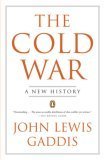More on this book
Community
Kindle Notes & Highlights
Liberty and justice, the Founding Fathers had insisted, could come only through constraining power.
It had long been Stalin’s habit, while hosting important visitors, to doodle wolves’ heads on a pad in red pencil, and this he did as he assured Marshall that the failure to settle the future of postwar Europe was no great problem: there was no urgency.
The Yugoslav dictator might be a “son-of-a-bitch,” the new American secretary of state, Dean Acheson, acknowledged astringently in 1949, but he was now “our son-of-a-bitch.”
The events in Prague, together with the Berlin blockade, convinced the European recipients of American economic assistance that they needed military protection as well: that led them to request the creation of a North Atlantic Treaty Organization, which committed the United States for the first time ever to the peacetime defense of Western Europe.
The Truman administration spent the next several months fending off McCarthy’s charges, which were themselves beginning to strain credulity as the senator scrambled desperately to substantiate them. However bad things were, an explanation alleging treason in high places seemed beyond the realm of plausibility—until, on June 25, 1950, North Korea launched an invasion of South Korea.
Kim in turn assured Stalin that “[t]he attack will be swift and the war will be won in three days.”
When, in April, 1951, it became clear that MacArthur did not agree with this policy, Truman promptly sacked him.
The only decisive outcome of the war was the precedent it set: that there could be a bloody and protracted conflict involving nations armed with nuclear weapons—and that they could choose not to use them.
Harry S. Truman claimed, for the rest of his life, to have lost no sleep over his decision, but his behavior suggests otherwise.
machines are ahead of morals by some centuries, and when morals catch up perhaps there’ll be no reason for any of it.”
Whether you like it or not, history is on our side,” Nikita Khrushchev once boasted before a group of western diplomats. “We will bury you.”


